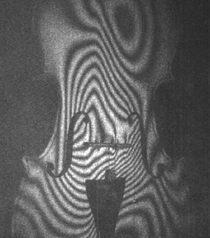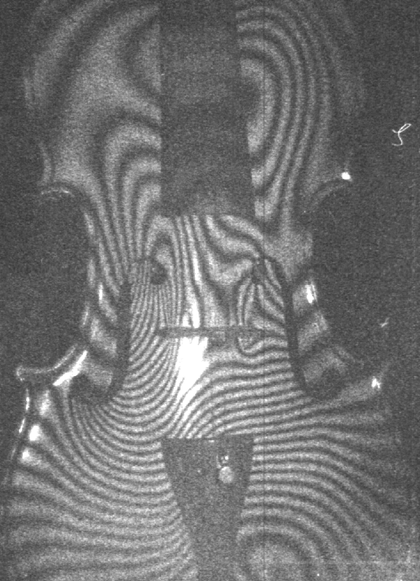Diagnostics_of_the_Violin_Body
3.2.5 Diagnostics of the Violin Body
Holographic interferometry is one of the possible methods of experimental research of diagnostic and defectoscopic quality inspections of the violin body and its parts. During the diagnostics and defectoscopy of the violin body we can apply three basic loadings. These loadings are used to provoke interference events. Through the analysis it is possible to visualise the material (wood) behaviour under the action of external forces, or visualise the types of defects and various inhomogenities occurring in the investigated violin body.
During the research and diagnostics of the violin body we applied mechanical load caused by string tension, heat load and acoustic excitation into vibrations.


a)b)
Fig. 3–49a) Visualisation of the bassbar action on the top soundboard when all strings are acting
b) Visualisation of the stick under mechanical stress
The experimental research of the top soundboard was carried out in the holographic set-up described in previous chapter (see Fig. 3–43). By the real-time method (see chapter 3.1.2) the possibility of visualisation of the bassbar glued into the internal side of the top soundboard was analysed (Fig. 3–49 a). At the same time the optimal values of both the mechanical and the heat loadings in which the investigated changes can be best visualised were verified. This information helped to obtain double-exposure holographic interferograms suitable for further studies.
The results obtained presented in Fig. 3–50 a and Fig. 3–50 b showed the presence of the bassbar from the external side of the top soundboard by formation of the interference field defects occurring during the direct mechanical loading by string tension. These sudden changes of the interference field can be caused either by larger cross-section of the bassbar, which causes also the oblique violin body deflection, or by small thickness of the top soundboard. Too large mass of the bassbar shifts the formants towards lower frequencies. On the high-quality concert instrument the sudden variations of interference fringes are not recorded. There the balance of the bassbar cross-section and the top soundboard thickness is evident (Fig. 3–51).
By comparison of the
holographic interferograms adequate to the bassbar positions during
the mechanical and heat loadings
(Fig. 3–50 a,
Fig. 3–50 b) it was proved that during the
application of either method of loading the interference field showed
similar defects always at the same place.


a)b)
Fig. 3–50a) Visualisation of the bassbar under mechanical stress
b) Visualisation of the bassbar under thermal stress

high-quality instrument (concert violin)
The results obtained by
experimental study of the possibilities and methods of diagnostics
and defectoscopy of different inhomogenities in violin bodies through
holographic interferometry methods show the possibility of using
either mechanical or heat loadings of the inspected parts
(Fig. 3–50 a,
Fig. 3–50 b).
The advantage of heat loading for identification of various elements
either desirable or undesirable is in its lower demands put on the
inspection equipment. During the mechanical loading from string
tension the requirements put on the technical quality of the
holographic measurement equipment increase proportionally to the
probability of creation of any undesirable noise that reduces the
amount of information in the holographic interferogram.
The presented results show that the holographic interferometry can be advantageously applied as a diagnostic and defectoscopic method for identification of the bassbar, its position and effect on the top soundboard, position of the soundpost and its manifestation on the bottom soundboard, ungluing of the individual parts of the instrument, propagation of cracks on both the top and bottom soundboards, properties of the coating compounds (Ružinská, 2005) and their time of hardening, prestress in the top soundboard, attack by biological pest (woodworm, dry-rot, fungi, etc.).


